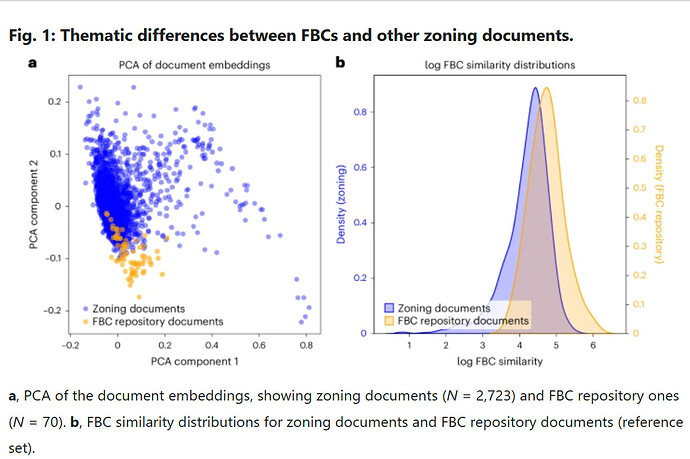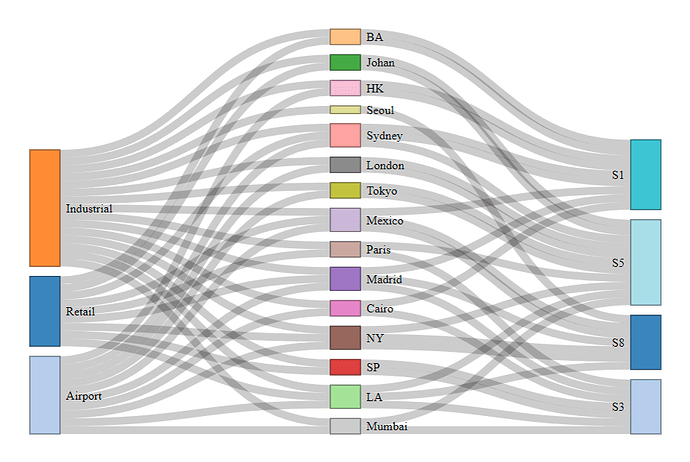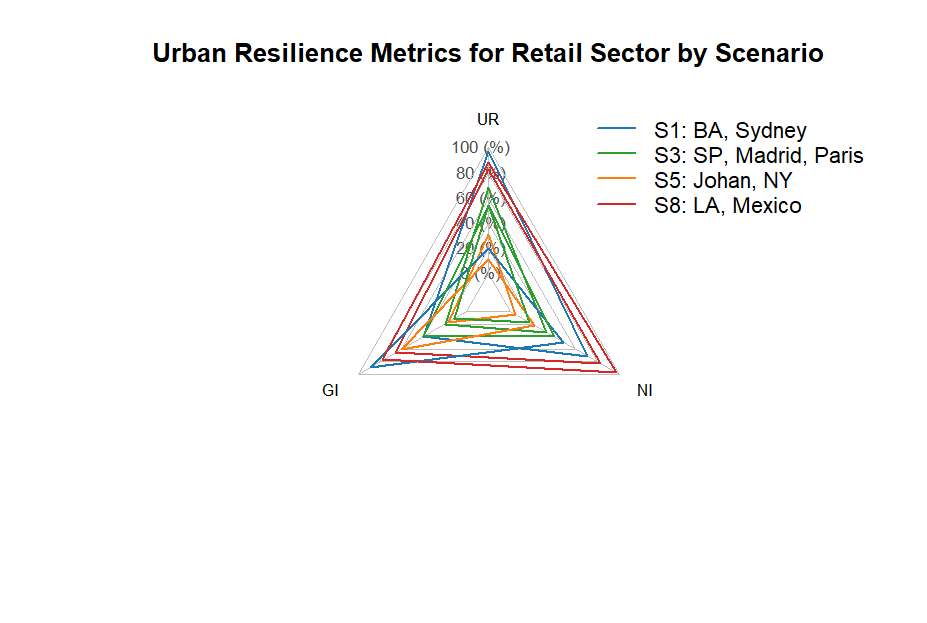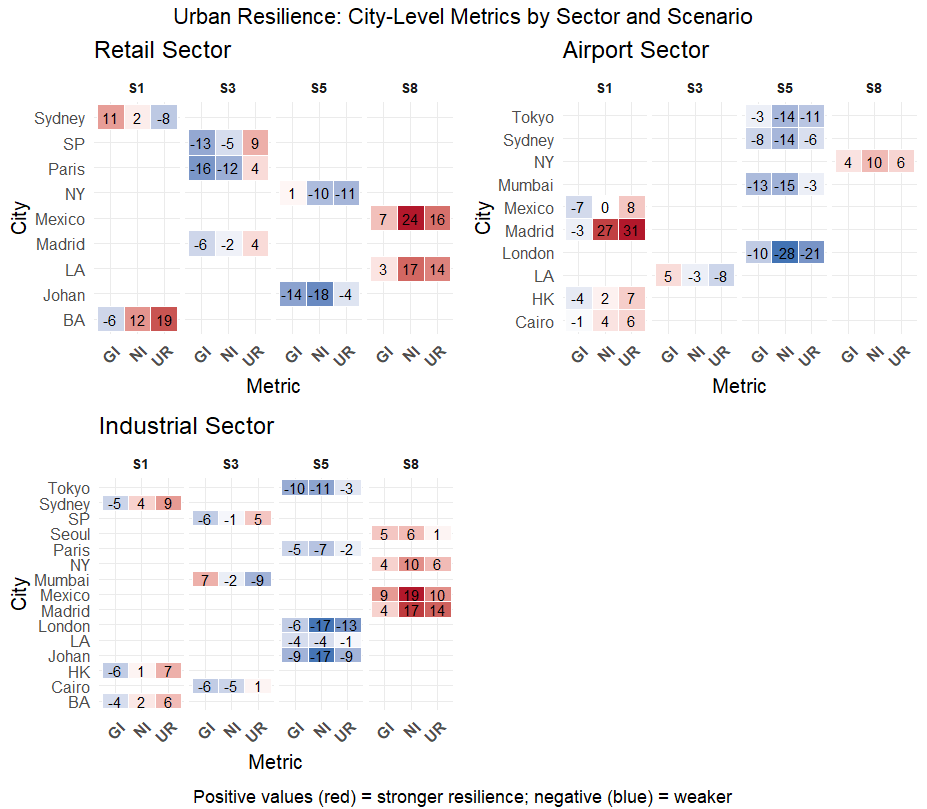I am looking for way(s) to plot my data for a paper I am about to publish in Nature Cities. I am pointing out the name of the journal to give context regarding the type of plot I am looking to create. Usually, in this journal the plots are magazine-like and usually they contain multiple figures in a single plot. An example of multiple plots in a single plot is shown below:
( Source: An AI-based analysis of zoning reforms in US cities)
A little bit about my dataset. I calculated 3 resilience metrics (UR, GI, NI) for several cities for 3 sectors and I classified the cities and their sectors into 4 scenarios based on the metrics performance. Now I am looking for ways to visualize the dataset in such a way that (the plot(s)) will tell a "meaningful" story. The story is urban resilience using nighttime lights data at the sector level. I tried some plots like:
(Sankey diagram)
(Spider plot)
(Heatmap)
I'd like recommendations for other plots that I might missed or don't know. As I see it, I want to highlight which cities belong to which scenario per sector in such a way that will make the intra-urban comparison per sector easy (i.e., for a given city to compare the sector perfomance) as well as the city comparison easy (i.e., for a given sector how the cities performed). Hopefully the way I described my problem make sense.
The dataset:
library(tibble)
######## retail ########
retail <- tibble::tribble(
~Sector, ~Metric, ~BA, ~Johan, ~LA, ~SP, ~Sydney, ~Madrid, ~Mexico, ~NY, ~Paris,
"Retail", "UR", 19, -4, 14, 9, -8, 4, 16, -11, 4,
"Retail", "GI", -6, -14, 3, -13, 11, -6, 7, 1, -16,
"Retail", "NI", 12, -18, 17, -5, 2, -2, 24, -10, -12
)
######## airport ########
airport <- tibble::tribble(
~Sector, ~Metric, ~Cairo, ~HK, ~LA, ~London, ~Sydney, ~Madrid, ~Mexico, ~Mumbai, ~NY, ~Tokyo,
"Airport", "UR", 6, 7, -8, -21, -6, 31, 8, -3, 6, -11,
"Airport", "GI", -1, -4, 5, -10, -8, -3, -7, -13, 4, -3,
"Airport", "NI", 4, 2, -3, -28, -14, 27, 0, -15, 10, -14
)
######## industrial ########
industrial <- tibble::tribble(
~Sector, ~Metric, ~BA, ~Cairo, ~HK, ~Johan, ~LA, ~London, ~SP, ~Seoul, ~Sydney, ~Madrid, ~Mexico, ~Mumbai, ~NY, ~Paris, ~Tokyo,
"Industrial", "UR", 6, 1, 7, -9, -1, -13, 5, 1, 9, 14, 10, -9, 6, -2, -3,
"Industrial", "GI", -4, -6, -6, -9, -4, -6, -6, 5, -5, 4, 9, 7, 4, -5, -10,
"Industrial", "NI", 2, -5, 1, -17, -4, -17, -1, 6, 4, 17, 19, -2, 10, -7, -11
)
########################### scenarios ###########################
######## retail ########
# Create the tibble
scenario_retail <- tibble(
city = c("BA", "Johan", "LA", "SP", "Sydney", "Madrid", "Mexico", "NY", "Paris"),
scenario = c("S1", "S5", "S8", "S3", "S1", "S3", "S8", "S5", "S3")
)
######## airport ########
scenario_airport <- tibble(
city = c("Cairo", "HK", "LA", "London", "Sydney", "Madrid", "Mexico", "Mumbai", "NY", "Tokyo"),
scenario = c("S1", "S1", "S3", "S5", "S5", "S1", "S1", "S5", "S8", "S5")
)
######## industrial ########
scenario_industrial <- tibble(
city = c("BA", "Cairo", "HK", "Johan", "LA", "London", "SP", "Seoul", "Sydney", "Madrid", "Mexico", "Mumbai", "NY", "Paris", "Tokyo"),
scenario = c("S1", "S3", "S1", "S5", "S5", "S5", "S3", "S8", "S1", "S8", "S8", "S3", "S8", "S5", "S5")
)
Session info
R version 4.4.3 (2025-02-28 ucrt)
Platform: x86_64-w64-mingw32/x64
Running under: Windows 11 x64 (build 26100)
Matrix products: default
locale:
[1] LC_COLLATE=English_United States.utf8 LC_CTYPE=English_United States.utf8 LC_MONETARY=English_United States.utf8
[4] LC_NUMERIC=C LC_TIME=English_United States.utf8
attached base packages:
[1] grid stats graphics grDevices utils datasets methods base
other attached packages:
[1] ggpubr_0.6.0 gridExtra_2.3 networkD3_0.4 fmsb_0.7.6 ggsci_3.2.0 data.table_1.17.0 units_0.8-7
[8] sf_1.0-20 terra_1.8-42 ggrepel_0.9.6 lubridate_1.9.4 forcats_1.0.0 stringr_1.5.1 dplyr_1.1.4
[15] purrr_1.0.4 readr_2.1.5 tidyr_1.3.1 tibble_3.2.1 ggplot2_3.5.1 tidyverse_2.0.0
loaded via a namespace (and not attached):
[1] gtable_0.3.6 htmlwidgets_1.6.4 rstatix_0.7.2 tzdb_0.5.0 vctrs_0.6.5 tools_4.4.3 generics_0.1.3
[8] proxy_0.4-27 pacman_0.5.1 pkgconfig_2.0.3 KernSmooth_2.23-26 lifecycle_1.0.4 compiler_4.4.3 farver_2.1.2
[15] munsell_0.5.1 codetools_0.2-20 carData_3.0-5 htmltools_0.5.8.1 class_7.3-23 yaml_2.3.10 Formula_1.2-5
[22] car_3.1-3 pillar_1.10.2 classInt_0.4-11 abind_1.4-8 tidyselect_1.2.1 digest_0.6.37 stringi_1.8.7
[29] labeling_0.4.3 fastmap_1.2.0 colorspace_2.1-1 cli_3.6.4 magrittr_2.0.3 utf8_1.2.4 broom_1.0.8
[36] e1071_1.7-16 withr_3.0.2 scales_1.3.0 backports_1.5.0 timechange_0.3.0 igraph_2.1.4 ggsignif_0.6.4
[43] hms_1.1.3 rlang_1.1.5 Rcpp_1.0.14 glue_1.8.0 DBI_1.2.3 rstudioapi_0.17.1 jsonlite_2.0.0
[50] R6_2.6.1



